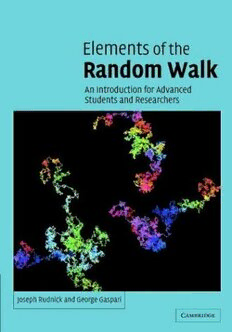Table Of ContentThis page intentionally left blank
ELEMENTS OF THE RANDOM WALK
AnIntroductionforAdvancedStudentsandResearchers
Randomwalkshaveproventobeausefulmodelinunderstandingprocessesacross
awidespectrumofscientificdisciplines.ElementsoftheRandomWalkisanintro-
ductiontosomeofthemostpowerfulandgeneraltechniquesusedintheapplication
oftheseideas.
The mathematical construct that runs through the analysis of each of the topics
coveredinthisbook,andwhichthereforeunifiesthemathematicaltreatment,isthe
generatingfunction.Althoughthereaderisintroducedtomodernanalyticaltools,
suchaspathintegralsandfield-theoreticalformalism,thebookisself-containedin
thatbasicconceptsaredevelopedandrelevantfundamentalfindingsfullydiscussed.
Thebookalsoprovidesanexcellentintroductiontofrontiertopicssuchasfractals,
scalingandcriticalexponents,pathintegrals,applicationoftheGLWHamiltonian
formalism, and renormalization group theory as they relate to the random walk
problem.Mathematicalbackgroundisprovidedinsupplementsattheendofeach
chapter,whenappropriate.
Thisself-containedtextwillappealtograduatestudentsacrossscience,engineer-
ing, and mathematics who need to understand the application of random walk
techniques,aswellastoestablishedresearchers.
Joseph Rudnick earned his Ph.D. in 1970. He has held faculty positions at
TuftsUniversityandtheUniversityofCalifornia,SantaCruz,aswellasavisiting
position at Harvard University. He is currently a Professor in the Department of
PhysicsandAstronomyattheUniversityofCalifornia,LosAngeles.
George GaspariiscurrentlyEmeritusProfessorattheUniversityofCalifornia,
SantaCruz.HehasheldvisitingpositionsattheUniversityofBristol,UK;Stanford
University; and the University of California Los Angeles. He has been a Sloan
FoundationFellow.
ELEMENTS OF THE RANDOM WALK
An Introduction for Advanced Students and Researchers
JOSEPH RUDNICK
DepartmentofPhysicsandAstronomyUniversityofCalifornia,
LosAngeles
GEORGE GASPARI
DepartmentofPhysicsUniversityofCalifornia,SantaCruz
cambridge university press
Cambridge, New York, Melbourne, Madrid, Cape Town, Singapore, São Paulo
Cambridge University Press
The Edinburgh Building, Cambridge cb2 2ru, UK
Published in the United States of America by Cambridge University Press, New York
www.cambridge.org
Information on this title: www.cambridge.org/9780521828918
© J. Rudnick and G. Gaspari 2004
This publication is in copyright. Subject to statutory exception and to the provision of
relevant collective licensing agreements, no reproduction of any part may take place
without the written permission of Cambridge University Press.
First published in print format 2004
isbn-13 978-0-511-18657-8 eBook (EBL)
isbn-10 0-511-18657-6
eBook (EBL)
isbn-13 978-0-521-82891-8 hardback
isbn-10 0-521-82891-0 hardback
Cambridge University Press has no responsibility for the persistence or accuracy of urls
for external or third-party internet websites referred to in this publication, and does not
guarantee that any content on such websites is, or will remain, accurate or appropriate.
ForAliceandNancy
Contents
Preface pagexi
1 Introductiontotechniques 1
1.1 Thesimplestwalk 1
1.2 Someveryelementarycalculationsonthesimplestwalk 5
1.3 Backtotheprobabilitydistribution 10
1.4 Recursionrelationfortheone-dimensionalwalk 13
1.5 Backing into the generating function for a random walk 15
1.6 Supplement:methodofsteepestdescents 20
2 GeneratingfunctionsI 25
2.1 Generalintroductiontogeneratingfunctions 25
2.2 Supplement1:Gaussianintegrals 41
2.3 Supplement2:Fourierexpansionsonalattice 42
2.4 Supplement3:asymptoticcoefficientsofpowerseries 47
3 GeneratingfunctionsII:recurrence,sitesvisited,andtheroleof
dimensionality 51
3.1 Recurrence 51
3.2 Anewgeneratingfunction 51
3.3 Derivationofthenewgeneratingfunction 52
3.4 Dimensionalityandtheprobabilityofrecurrence 55
3.5 Recurrenceintwodimensions 58
3.6 Recurrencewhenthedimensionality,d,liesbetween2and4 60
3.7 Theprobabilityofnon-recurrenceinwalksondifferentcubic
latticesinthreedimensions 62
3.8 Thenumberofsitesvisitedbyarandomwalk 63
4 Boundaryconditions,steadystate,andtheelectrostaticanalogy 69
4.1 Theeffectsofspatialconstraintsonrandomwalkstatistics 70
4.2 Randomwalkinthesteadystate 82
4.3 Supplement:boundaryconditionsatanabsorbingboundary 93
vii
viii Contents
5 Variationsontherandomwalk 95
5.1 Thebiasedrandomwalk 95
5.2 Thepersistentrandomwalk 98
5.3 Thecontinuoustimerandomwalk 118
6 Theshapeofarandomwalk 127
6.1 Thenotionandquantificationofshape 127
6.2 Walksind (cid:2) 3dimensions 135
6.3 Finalcommentary 154
6.4 Supplement1:principalradiiofgyrationandrotationalmotion 154
6.5 Supplement2:calculationsforthemeanasphericity 159
6.6 Supplement3:derivationof(6.21)fortheradiusofgyration
↔
tensor,T,andtheeigenvaluesoftheoperator 165
7 Pathintegralsandself-avoidance 167
7.1 Theunrestrictedrandomwalkasapathintegral 168
7.2 Self-avoidingwalks 171
8 Propertiesoftherandomwalk:introductiontoscaling 193
8.1 Universality 193
9 Scalingofwalksandcriticalphenomena 203
9.1 Scalingandtherandomwalk 203
9.2 Criticalpoints,scaling,andbrokensymmetries 204
9.3 Ginzburg–Landau–WilsoneffectiveHamiltonian 215
9.4 Scalingandthemeanend-to-enddistance;(cid:4)R2(cid:5) 218
9.5 Connectionbetweenthe O(n)modelandtheself-avoidingwalk 219
9.6 Supplement:evaluationofGaussianintegrals 227
10 Walksandthe O(n)model:meanfieldtheoryandspinwaves 233
10.1 Meanfieldtheoryandspinwavescontributions 233
10.2 Themeanfieldtheoryofthe O(n)model 236
10.3 Fluctuations:loworderspinwavetheory 239
10.4 Thecorrelationhole 251
11 Scaling,fractals,andrenormalization 255
11.1 Scaleinvarianceinmathematicsandnature 255
11.2 Moreontherenormalizationgroup:therealspacemethod 264
11.3 Recursionrelations:fixedpointsandcriticalexponents 277
12 Moreontherenormalizationgroup 285
12.1 Themomentum-shellmethod 285
12.2 TheeffectiveHamiltonianwhenthereisfourthorder
interactionbetweenthespindegreesoffreedom 286

